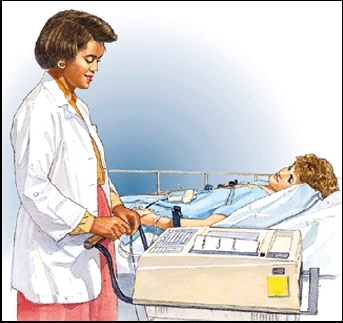Electrocardiogram (ECG)
Electrocardiogram (ECG)
The electrocardiogram (ECG) is a test that records electrical signals from your heart. The pattern of these signals can help tell the doctor whether your heart is normal, under stress, or having electrical problems, changes in the heartbeat, strain, or other damage.
Getting ready
Wear loose, comfortable clothing that allows easy access to the chest.
Allow enough time before your ECG to check in. You will likely need to fill out paperwork before the test.
What happens during an ECG
You will be asked to remove your clothing from the waist up and to put on a gown. You will then lie down on your back.
Electrodes (small pads) are placed on your chest, shoulders, and legs. If you have excess body hair that keeps the electrodes from making contact with your skin, small patches of hair may need to be shaved.
If your skin is moist or sweaty, it may have to be dried off for the small patches to stick to the skin.
The electrodes record your heart rhythm and any change in your heart’s signals that occur during the test.
After a few minutes of recording, the healthcare provider will remove the electrodes. Occasionally, they may have to repeat the ECG to get accurate results. The ECG takes about 10 minutes.
What happens after the test
You can resume your normal activity.
The results are sent to your doctor for interpretation.
Be sure to keep your follow-up appointment.
Your next appointment is:____________________
Tell your healthcare provider if you:
Are taking any medicines including over-the-counter, recreational drugs, and non-prescribed medicines
Feel any chest discomfort, pain, burning, tightness, or pressure
Feel as though your heart is beating rapidly or irregularly (palpitations)
Have ever blacked-out, lost consciousness, or fainted
Updated:
March 21, 2017
Reviewed By:
Gandelman, Glenn, MD, MPH,Snyder, Mandy, APRN
